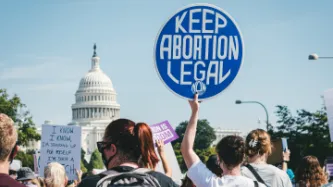Search
Content type: Long Read
Introduction
The 28th of September marks International Safe Abortion Day. It remains a day necessary to mobilise and raise awareness of the continued struggles women and girls face when accessing reproductive healthcare, including access to safe abortion. Across the world, abortion continues to be criminalised, restricted and in some places under attack. All of which constitute severe obstacles for women and girls to fully exercise their human rights, particularly their right to privacy, which…
Content type: News & Analysis
The relationship between privacy and access to abortion care
In 1973, in the state of Texas, it was a criminal offence to “procure or attempt” an abortion except if the purpose was “saving the life of the mother.” This law was enacted in 1854 by the Texas state legislature, and was part of a wave of provisions criminalising access to abortion care that was gaining ground across the U.S in the mid-1800s. It is worth highlighting that these laws were being passed at a time when women in the U.S…
Content type: Long Read
This piece is a part of a collection of research that demonstrates how data-intensive systems that are built to deliver reproductive and maternal healthcare are not adequately prioritising equality and privacy.
What are they?
Short Message Services (SMS) are being used in mobile health (MHealth) initiatives which aim to deliver crucial information to expecting and new mothers. These initiatives are being implemented in developing countries experiencing a large percentage of maternal and…
Content type: Case Study
The right to privacy is one of the precedents used to establish reproductive rights. Laws and policies which impede upon individuals’ rights to access sexual and reproductive health services may also interfere with individuals’ right to privacy and to make autonomous decisions as it pertains to their health and fertility, meaning the two are linked. Reproductive rights are necessary for bodily autonomy.
Reproductive rights have, more recently, been put at risk by one of the most concerning…
Content type: Long Read
This piece was written by Aayush Rathi and Ambika Tandon, who are policy officers at the Centre for Internet and Society (CIS) in India. The piece was originally published on the website Economic Policy Weekly India here.
In order to bring out certain conceptual and procedural problems with health monitoring in the Indian context, this article posits health monitoring as surveillance and not merely as a “data problem.” Casting a critical feminist lens, the historicity of surveillance practices…
Content type: Advocacy
TEDIC, InternetLab, Derechos Digitales, la Fundación Karisma, Dejusticia, la Asociación por los Derechos Civiles y Privacy International acogen el llamado de la Relatoría Especial sobre Derechos Económicos, Sociales, Culturales y Ambientales (DESCA) de la Comisión Interamericana de Derechos Humanos (CIDH) de enviar información para la elaboración del Informe Anual sobre DESCA del año 2019, que se presentará ante la Organización de los Estados Americanos (OEA) en 2020.
El objeto de este…
Content type: Advocacy
TEDIC, InternetLab, Derechos Digitales, Fundación Karisma, Dejusticia, Asociación por los Derechos Civiles and Privacy International welcome the call made by the Special Rapporteurship on Economic, Social, Cultural and Environmental Rights (ESCER) of the Inter-American Commission on Human Rights (IACHR) to inform the preparation of the Annual Report of the ESCER for the year 2019, which will be presented to the Organization of American States (OAS) during 2020.
This submission aims to outline…






